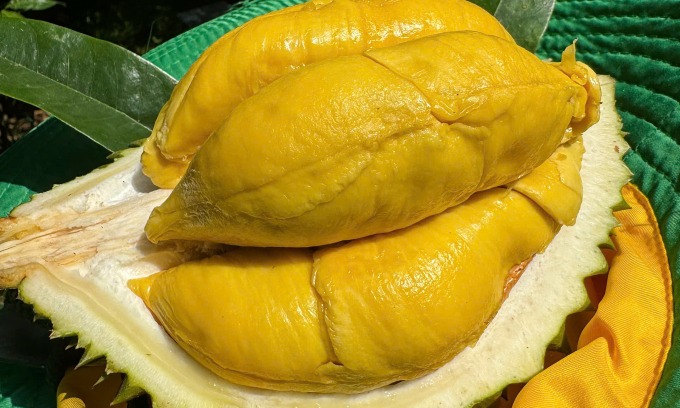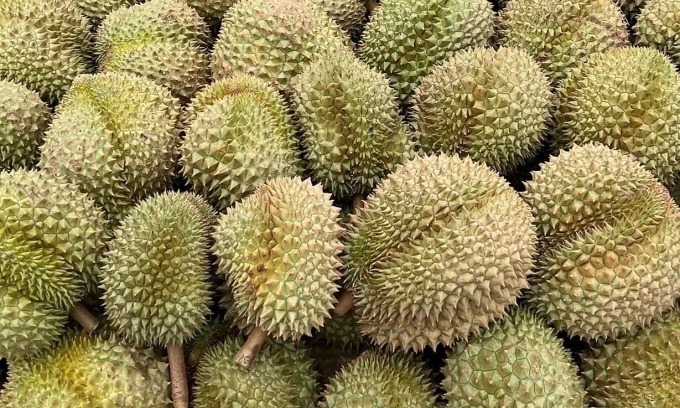Vietnam is facing challenges in exporting durians to China due to more stringent quarantine regulations and increased competition from other nations, leading to a significant decline in local market prices.
Fruit containers may take up to a week for clearance at the border, compared to just one or two days previously, due to Chinese customs conducting a 100% inspection of all deliveries for prohibited substances, which increases the likelihood of deterioration in quality.
One durian dealer mentioned that some shipments ultimately clear inspections, yet the fruits arrive at Chinese wholesale markets damaged or split because of the extended waiting period.
This has compelled fruit growers in the Mekong Delta to reduce their prices by 30%, bringing them down to VND35,000-70,000 ($1.35-$2.69) per kilogram, which is only one-third of what they received last year. During the initial two months, durian shipments to China dropped dramatically by 83% compared to the previous year, amounting to just $27 million.
Part of the decline in exports is due to businesses being cautious and now reluctant to export substantial quantities.
Many traders in
durian-growing areas
Similar to Can Tho City and Ben Tre Province, many areas have halted purchases of the fruit out of concern for potential financial losses.
In China, Vietnam’s market share has declined from 62% to 37%, whereas Thailand’s has surged from 37% to 62.3%. Despite China maintaining rigorous inspection standards for Thai durians, the Thai government has taken steps to keep export levels robust.
China has increased inspections of Vietnamese durians for heavy metal contaminants and prohibited substances such as auramine O, which is commonly used in farming but is banned because of its carcinogenic risks.
Alerts regarding fake cultivation zone codes and breaches of plant health regulations have led numerous companies to halt their export activities to ensure they meet all requirements. Additionally, emerging competitors like those based in Laos, Indonesia, and Cambodia have added further obstacles for these businesses.
Recently, Laos’s Attapeu Province granted permission to three firms for cultivating more than 273 hectares of commercial durian aimed at supplying China.
Chinese companies joined forces with the Lao Chamber of Commerce to establish the Durian Business Association and launch a research center, acquiring 12,000 hectares for dedicated farming. Meanwhile, Indonesia is stepping up its efforts to tap into this lucrative billion-dollar market.

|
|
A durian harvested from a farm located in the Mekong Delta city of Can Tho. Image courtesy of VnExpress/Manh Khuong. |
With an annual output of 1.8 million tons—the largest globally—Indonesia’s plantations and packaging facilities have been examined by Chinese customs officials. They are currently wrapping up logistics and quarantine procedures. Central Sulawesi province alone has documented more than 3,000 hectares of land that meet export criteria.
Cambodia is also joining the competition. In April, it signed an agreement with China to export durians, birds’ nests, and farm-raised crocodiles as part of 37 new cooperative accords aimed at opening up opportunities for its agriculture industry.
“Ever since the Lunar New Year holidays in February, we have struggled to return our exports to regular volumes because of extended formalities and lengthy customs clearance processes,” stated Doan Van Ven, the director of agricultural exporter Anh Thu Dak Lak Co based in the Central Highlands.
Only a few new contracts have been finalized with Chinese buyers, he added.Some traders in the southern province of Tien Giang have stopped buying durian from farmers due to quality concerns. They want the government to roll out on-site testing mechanisms to reduce costs for both farmers and traders.
Dang Phuc Nguyen, who serves as the general secretary of the Vietnam Fruit and Vegetable Association, noted that shipments of fruits and vegetables, notably durians, to China have significantly decelerated. In the initial three months of this year, China only imported about $500 million worth of Vietnamese agricultural goods, marking a 31% decrease compared to the same period last year.
In Vietnam, fruit testing currently requires a week, which affects the quality. Exporters are aiming to reduce this timeframe to three or four days and wish to expand the number of testing facilities recognized by China.
They suggest informing farmers about utilizing approved fertilizers and steering clear of illegal products containing prohibited substances, as well as taking strict action against inferior fertilizer manufacturers. Nguyen urged for more robust governmental involvement to aid in restoring exports. He pondered aloud, “If we can manage diseases in livestock and poultry, why struggle to eliminate banned substances in durians?”
Phung Duc Tien, Deputy Minister of Agriculture and Environment, emphasized that adopting sustainable practices is crucial for ensuring the enduring expansion of the durian sector.


Leave a Reply